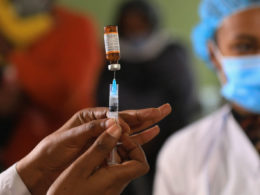According to the World Health Organisation (WHO) in 2018, there were more than 140 000 measles deaths globally, mostly among children under the age of five despite the availability of a safe and cost-effective vaccine.
Below is what you need to know about measles:
WHAT IS MEASLES?
· Measles is a highly contagious disease caused by a virus in the paramyxovirus family and it is normally passed through direct contact and through the air.
· The virus infects the respiratory tract, and then spreads throughout the body.
· Accelerated immunization activities have had a major impact on reducing measles deaths.
· During 2000– 2018, measles vaccination prevented an estimated 23.2 million deaths.
SIGNS AND SYMPTOMS
· The first sign of measles is usually a high fever, which begins about 10 to 12 days after exposure to the virus, and lasts 4 to 7 days.
· A runny nose, a cough, red and watery eyes, and small white spots inside the cheeks can develop in the initial stage.
· After several days, a rash erupts, usually on the face and upper neck.
· Over about 3 days, the rash spreads, eventually reaching the hands and feet.
· The rash lasts for 5 to 6 days and then fades. On average, the rash occurs 14 days after exposure to the virus (within a range of 7 to 18 days).
WHO IS AT RISK?
· Unvaccinated young children are at the highest risk of measles and its complications, including death.
· Unvaccinated pregnant women are also at risk.
· Any non-immune person (who has not been vaccinated or was vaccinated but did not develop immunity) can become infected.
· Measles is still common in many developing countries – particularly in parts of Africa and Asia.
· The overwhelming majority (more than 95%) of measles deaths occur in countries with low per capita incomes and weak health infrastructures.
· Measles outbreaks can be particularly deadly in countries experiencing or recovering from a natural disaster or conflict.
· Damage to health infrastructure and health services interrupts routine immunisation, and overcrowding in residential camps greatly increases the risk of infection.
DO ADULTS GET INFECTED WITH MEASLES AS WELL?
· Although measles is often associated with childhood illness, adults can get measles too.
· People who aren’t vaccinated are at a higher risk of catching the disease.
· It is however generally accepted that adults born during or before 1957 are naturally immune to measles.
· This is because the vaccine was first licensed in 1963.
TRANSMISSION
· Measles is one of the world’s most contagious diseases.
· It is spread by coughing and sneezing, close personal contact or direct contact with infected nasal or throat secretions.
· The virus remains active and contagious in the air or on infected surfaces for up to 2 hours.
· It can be transmitted by an infected person from 4 days prior to the onset of the rash to 4 days after the rash erupts.
· Measles outbreaks can result in epidemics that cause many deaths, especially among young, malnourished children.
· In countries where measles has been largely eliminated, cases imported from other countries remain an important source of infection.
TREATMENT
· No specific antiviral treatment exists for the measles virus.
· Severe complications from measles can be reduced through supportive care that ensures good nutrition, adequate fluid intake and treatment of dehydration with WHO-recommended oral rehydration solution.
· This solution replaces fluids and other essential elements that are lost through diarrhoea or vomiting.
· Antibiotics should be prescribed to treat eye and ear infections, and pneumonia.
· All children diagnosed with measles should receive two doses of vitamin A supplements, given 24 hours apart.
· This treatment restores low vitamin A levels during measles that occur even in well-nourished children and can help prevent eye damage and blindness.
· Vitamin A supplements have also been shown to reduce the number of measles deaths.
PREVENTION
· Routine measles vaccination for children, combined with mass immunization campaigns in countries with high case and death rates, are key public health strategies to reduce global measles deaths.
· The measles vaccine has been in use for nearly 60 years. It is safe, effective and inexpensive.
· The measles vaccine is often incorporated with rubella and/or mumps vaccines.
· It is equally safe and effective in the single or combined form.
· Adding rubella to the measles vaccine increases the cost only slightly and allows for shared delivery and administration costs.
· CDC recommends all children get two doses of MMR (measles-mumps-rubella) vaccine, starting with the first dose at 12 through 15 months of age, and the second dose at 4 through 6 years of age.
· Children can receive the second dose earlier as long as it is at least 28 days after the first dose.
MEASLES-RELATED DEATHS & COMPLICATIONS
· Most measles-related deaths are caused by complications associated with the disease.
· Serious complications are more common in children under the age of 5, or adults over the age of 30.
· The most serious complications include blindness, encephalitis (an infection that causes brain swelling), severe diarrhoea and related dehydration, ear infections, or severe respiratory infections such as pneumonia.
· Severe measles is more likely among poorly nourished young children, especially those with insufficient vitamin A, or whose immune systems have been weakened by HIV/AIDS or other diseases.









